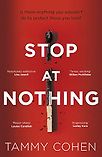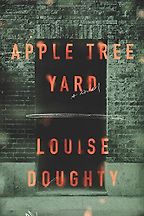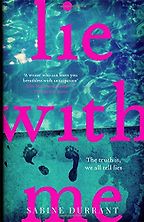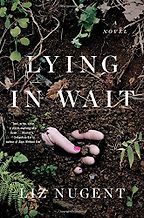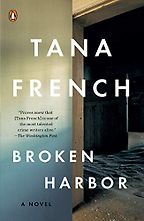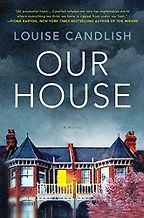What is a psychological thriller, and what are its origins as a genre?
There have always been psychological thrillers, although obviously they weren’t always called that. Medea is a psychological thriller: it’s about a wife getting her revenge on her husband; a dysfunctional family. Similarly, Othello is a psychological thriller about whether you can trust your husband. Rebecca has a similar theme. As a trope, the psychological thriller has been around forever because we’re all fascinated by dysfunction—dysfunctional relationships, dysfunctional families. There’s that Tolstoy quote that all happy families resemble each other, but every unhappy family is unhappy in its own way. It’s always been the same.
The psychological thriller explores our internal state, our internal fears, our relationships, the way we see ourselves in our domestic world, in our small world, interacting with the people around us. And it plays on our fears about things that could go wrong within that sphere. It doesn’t have to be domestic, but it usually takes place within a small group, which gives it that claustrophobic feeling.
And does something always have to go wrong in a psychological thriller, or can the terror be all in the mind?
Yes, of course, it can all be in the mind. That is a sub-genre of the psychological thriller, the unreliable narrator, with the reader trying to guess how much of what we’re being told is real and how much isn’t; how much it is all in the mind of the protagonist, of the person whose head we’re inside.
You see that in a lot of Hitchcock films, like Gaslight. There’s often a protagonist who doesn’t know whether she (or he) is going mad or if these things are actually happening to them.
A lot of people like to categorise a psychological thriller as a ‘whydunit?’ rather than a ‘whodunit?’. So, there is often a crime or a tragedy of some kind and it’s not so much about finding out who did it as about finding out why it happened, and often about its repercussions.
It’s about exposing the gap between our public and private selves, between the self we show to the world and who we are inside. Everyone has an internal narrator and mostly we would be horrified to share that internal narrative with the world. But that’s what a psychological thriller often does.
“It’s about being afraid of the husband across the breakfast table or the family next door”
Sometimes they’ve been called ‘domestic noir’, and although psychological thrillers don’t have to be set in the home, one thing they do quite well is explore the very inherent human fear of our home not being safe, not being a refuge; the fear of not being able to trust the people closest to us. It’s not about being afraid of the bogeyman in the alley. It’s about being afraid of the husband across the breakfast table or the family next door. It’s about that disconnect between the surface and what’s actually happening underneath and the fear that we might not be able to recognise danger or evil, even when we’re looking at it every day. And that even extends to our own selves, this idea that our own memories are untrustworthy, that our motives aren’t trustworthy, and that we’re lying to ourselves as well as to others.
Often psychological thrillers come down to that – to people lying to themselves. They can’t bear their own reality, or the reality of what they’ve done, and they make up stories to protect themselves. At heart, the genre is about what it is to be human and to interact with other humans and about the fears that we all have as humans.
How do you go about dreaming up plots? Are there common themes to your own work, or particular aspects of human psychology that you’re preoccupied with?
I am absolutely fascinated by dysfunctional families, as I think most people are. I think we’re all secretly nosy. We want to know what’s going on over the garden fence. We want to know what’s going on behind people’s doors, because we want to compare it to our own life in some way.
I’m fascinated by the gap between who people really are and what they’re showing the world, and this idea that that we never really know what’s going on in somebody else’s life, in somebody else’s house, in somebody else’s marriage. I find that exploration of what lies behind the façade endlessly interesting.
Get the weekly Five Books newsletter
A lot of psychological thrillers hinge on something very small—a split-second decision—which then brings the whole edifice of their life crashing down. There’s the world before and the world after. Someone can make a very tiny error of judgment or give in briefly to a temptation and, as a result, they lose their footing and then they lose everything.
But life can be like that. I think this whole lockdown exposes the fact that normal life actually hangs by a thread. We fool ourselves into believing that the world as we know it is a certain way, that the lives we’ve built up are completely solid and that things will go on exactly as they always have. But overnight everything has changed.
We are confronted by the uncomfortable truth that actually nothing is solid under our feet and that life can turn on a sixpence, that the tiniest little loose thread can be pulled and pulled until the whole thing unravels. Those are the kinds of ideas that really interest me and that are written into the DNA of the psychological thriller.
Let’s move on to the psychological thrillers you want to recommend. The first is Apple Tree Yard by Louise Doughty. Without giving anything away, tell us a bit about what the book’s about and why this one made your list.
It opens in the Old Bailey with Dr Yvonne Carmichael—a highly respected geneticist, a respectable married woman who’s published a lot of academic papers, and who advises the government on scientific policy—in the dock, accused of something dreadful. We don’t know what and we don’t know why.
It’s a first-person narrative, so we are inside her head. In this opening scene, she starts off feeling quite sure of herself and then there’s this building sense of panic that something is about to be revealed by the prosecution that will bring everything tumbling down and that her life will be completely and irrevocably changed. That’s the opening and then the whole book goes back through what’s happened to bring her to this point, starting with her illicit encounter with a complete stranger in a broom cupboard in the House of Commons. That act, completely out of character, kickstarts the torrid affair that will bring her life tumbling down.
At first, it’s a story of sexual obsession, but then something happens to her in her own life. She gets assaulted. And she uses this stranger, with whom she is having this affair, whom she knows absolutely nothing about, but onto whom she projects all her own fantasies, to enact her retribution, and it all goes horribly, horribly wrong.
“I always love a dislikeable main character and he is despicable right from the word go.”
The reason I chose this book is because it works on so many levels. It’s so layered. On one level, there’s this story of sexual obsession and revenge and all those big themes. On another level, you’ve got the scientist who’s forced to confront the irrationality of her own responses and actions. Another level is about the lies that we all tell and that she tells. At one point, she actually says that the trouble with stories is that they’re addictive. She’s telling stories all the time, to her husband, to her lover and, in the end, to herself and—more importantly—to the reader. But we only really realize that very, very gradually because, as a scientist, she’s so forensic in her descriptions and we believe in her authority and accept what she tells us. It’s only right towards the end that we start to realize that she might have been lying, not only to herself, but to us. That’s hugely wrong-footing. As a reader it’s deeply unsettling.
And I believe psychological thrillers always, at heart, need to be unsettling, so the book works on all those levels I’ve mentioned. At its core is this idea of the unreliable narrator. It’s a first-person account. We’re in her head and we have to take all our cues from her, but we gradually question whether we can completely trust her.
The next psychological thriller to make your list is Lie With Me by Sabine Durrant.
The main character is a very dislikable man called Paul Morris. I always love a dislikable main character and he is despicable right from the word go. He’s an egomaniac, he’s misogynistic and vain. He’s free-loading and convinced of the powers of his own charm in all situations. So, we start off absolutely detesting him and yet, by the end of it, bizarrely, we’re rooting for him. And it’s because, over the course of the book, he stays true to himself and his integrity remains intact— whereas we gradually realize that the people around him are the ones who lack integrity, because they’re not what they purport to be.
Paul Morris gets himself invited along on a holiday. He fancies a summer holiday in a Greek villa that he doesn’t have to pay for. He quite fancies the hostess and thinks he’s in with a chance. So, he happily goes off to Pyros, this island where ten years before he had gone on a drunken bender that he doesn’t remember very much about.
He goes back there and happily freeloads in this lovely villa with this family. He starts off feeling like he’s in control, that he is the one manipulating events, but as the book unfolds we realise that actually he’s the one being manipulated and our sympathies switch.
And, at the heart of it, there’s the disappearance of a girl on the island, is that right?
It transpires that the drunken bender he was on with friends ten years before is going to come back to haunt him. There’s the historic disappearance of a young girl from that time and then there’s something that happens to another young girl in the present day.
Let’s move on to the next psychological thriller on your list. This is Lying in Wait by Liz Nugent.
Liz Nugent is absolutely brilliant at monstrous characters. She puts us right inside their heads and we’re both fascinated and appalled by them. We might consider them psychopaths, although Nugent is careful never to label them herself.
We watch with a kind of gleeful, hand-over-mouth horror as they wreak damage on the people around them, without any kind of self-awareness. I just love them. The main character in this book is Lydia Fitzsimmons. She’s the wife of a judge and she seems to have this perfect life, living in a beautiful house with her husband and son, but she is actually a complete monster.
“At heart, the genre is about what it is to be human and to interact with other humans and about the fears that we all have”
The book has the greatest first line of any psychological thriller, which is: “My husband did not mean to kill Annie Doyle, but the lying tramp deserved it.” That sets the tone for the whole book.
Lydia’s husband, the judge, has killed a sex worker and together they bury the body in the garden. Her son, whom she adores but towards whom she is overbearing and controlling, discovers the body and becomes obsessed with finding out who the dead girl is, inveigling himself into her family life.
In one sense the book is about the murder, but mostly it’s about this toxic woman and what she does to her family and the lengths she’ll go to to keep her family under her control. She medicates her son to keep him fat so that he won’t leave her. She’s just so monstrous but so compelling at the same time, just a brilliant creation.
There’s no twist in it that generates any sympathy for her in the reader?
We gradually find out about her childhood. She was adored by her father and always kept like a princess. So, she’s always thought that the world owes her that for her entire life. There’s no need for a big twist, with this book it’s more about the piling on of these terrible things that this woman does and says, the piling on of the tension and how torn we are between wanting her to get her comeuppance, but at the same time wanting to carry on watching her.
Let’s go on to Broken Harbour by Tana French. This is one of a series, is that right?
Yes. The series is based around the Dublin Murder Squad. I haven’t read all of them. But each one focuses on a different detective in the squad. Each has their own baggage that they bring. French highlights one detective in each book and the others are bit characters in the background. In this one, it’s a detective called Scorcher Kennedy.
A family has been found dead—well, the husband and two children are dead and the wife is in a coma—in a ghost housing estate called Brianstown, which was once known as Broken Harbour, just outside Dublin. This housing estate was one of the casualties of the Irish property crash. There was the housing boom followed by the crash that happened in 2008 and left a trail of halfway-built luxury developments as ghost towns.
Some people had already bought these houses off plan. Because they were only half-built there was often no infrastructure, but people still had to live there because they couldn’t sell them. This is what has happened to this family, the Spains, and why they were stuck living in this abandoned development. The father was laid off from work and hadn’t worked for six months. So, the assumption is it’s a murder-suicide.
Scorcher Kennedy is brought in to investigate, but there are some very strange elements to this case. The house is immaculate inside, but it’s full of holes drilled in the walls. There’s a big trap in the attic with iron teeth and there are baby monitors everywhere, even though the Spain kids were far too old to need them. There are all these elements of mystery that don’t quite support the murder-suicide theory. The book revolves around the investigation into what happened in that house. It becomes clear that this man, who had been laid off and who, along with his whole family, was trapped somewhere they really didn’t want to be, gradually lost his grip on reality.
Five Books interviews are expensive to produce. If you're enjoying this interview, please support us by donating a small amount.
But there’s another layer, which is that detective Scorcher Kennedy used to come to Broken Harbour, as it was then called, on holiday as a child. And something awful happened on one of these childhood holidays, that caused a major rift in his family. This is revealed bit by bit, as he’s unravelling the mystery in the present day.
And do the two sides of the story come together?
They come together in the sense that we’ve talked about—of dysfunctional families being connected by the common thread of their unhappiness. It’s all about family secrets and tensions at the heart of family life, what people communicate and what they keep to themselves.
Your final psychological thriller is Our House by Louise Candlish
This book has the most brilliant premise and as a reader you just can’t believe Candlish is actually going to be able to stand it up. A woman, Fi Lawson, returns from a few days away to find a family she’s never met before moving into her beautiful, beloved house on Trinity Avenue in a very affluent part of South West London. They insist that they’ve bought it and they now own it. Fi Lawson’s husband, Bram, has disappeared.
That’s the premise. It’s a dual narrative, mostly from her point of view, but we also hear from the husband and his thread is about how one miscalculation, one error of judgment, sets in motion this snowball effect that ruins all their lives and that ends up with the house being sold without his wife’s knowledge. I can’t say more than that without giving it away.
“Psychological thrillers explore the very human fear of our home not being safe, not being a refuge. The fear of not being able to trust the people closest to us”
The book is a puzzle. First we must work out whether these people, these new owners, have the right to be there. Second, how they got there; and third, what happened to enable Bram Lawson to sell the house from under his wife’s nose without her knowing it. It’s all revealed incrementally and it all makes complete sense.
Is the family that moves in sinister in some way?
No. Everything’s normal. It is all legal and there is nothing she can do about it. The rug of her entire life is pulled out from under her feet in one go. She’s come home to discover that her home isn’t hers anymore and that her husband isn’t there anymore and the life she knew no longer exists.
It subsequently transpires that Fi herself has been hiding things. So, she’s got secrets and her husband has secrets. And between the two of them these secrets unseat both of their lives. The book also has the best closing line, a late twist that makes you gasp out loud. It’s brilliant.
Five Books aims to keep its book recommendations and interviews up to date. If you are the interviewee and would like to update your choice of books (or even just what you say about them) please email us at [email protected]

